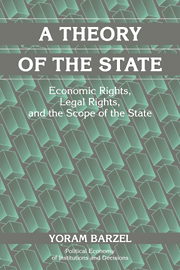Book contents
- Frontmatter
- Contents
- Preface
- 1 Introduction
- I The Emergence of Protection and Third-Party Enforcement
- II The Emergence of Legal Institutions
- III The Character of the State
- 12 Merger and Local Autonomy
- 13 The Distinction between “Legitimate” and “Criminal” States
- 14 Power, Violent Conflict, and Political Evolution
- 15 The Time Path of Change under Dictatorships and under Rule-of-Law Regimes
- 16 Recapitulation and an Epilogue
- References
- Index
- Other Books in the Series
13 - The Distinction between “Legitimate” and “Criminal” States
Published online by Cambridge University Press: 04 December 2009
- Frontmatter
- Contents
- Preface
- 1 Introduction
- I The Emergence of Protection and Third-Party Enforcement
- II The Emergence of Legal Institutions
- III The Character of the State
- 12 Merger and Local Autonomy
- 13 The Distinction between “Legitimate” and “Criminal” States
- 14 Power, Violent Conflict, and Political Evolution
- 15 The Time Path of Change under Dictatorships and under Rule-of-Law Regimes
- 16 Recapitulation and an Epilogue
- References
- Index
- Other Books in the Series
Summary
As pointed out in earlier chapters, the state is neither the only organization to engage in delineation nor the only one to use force to enforce rights within what is conventionally viewed as its territory. Other organizations operating in the same territory can act similarly. The medieval Catholic church, for example, delineated certain religion-related rights and sometimes was allowed to use force to enforce them within states that it did not control. States sanction, or at least tolerate, some of these organizations. In this chapter, I focus on criminal organizations operating within the state, but banned by it. They resemble the state in that they, too, delineate rights and forcefully enforce them.
As argued in Chapter 6, the state and criminal organizations can be viable side by side only if they differ in the kinds of power they use. The state seems to have a comparative advantage in the open use of arms and in the use of heavier weapons such as armored cars. Criminal organizations' advantage is in the covert use of arms, and they tend to use small, easy-to-conceal weapons. States can neither easily overpower criminal organizations nor effectively compete with them in their domain.
The two enforce different kinds of agreements; criminal organizations enforce primarily agreements that the state prohibits. They also differ in the ways they adjudicate disputes. Criminal organizations are unlikely to hold their trials in public and probably are less fussy than the legitimate state in the quality of evidence they require. We can expect transactors, then, to be more selective in the agreements they bring to criminal organizations for enforcement.
- Type
- Chapter
- Information
- A Theory of the StateEconomic Rights, Legal Rights, and the Scope of the State, pp. 228 - 237Publisher: Cambridge University PressPrint publication year: 2001



